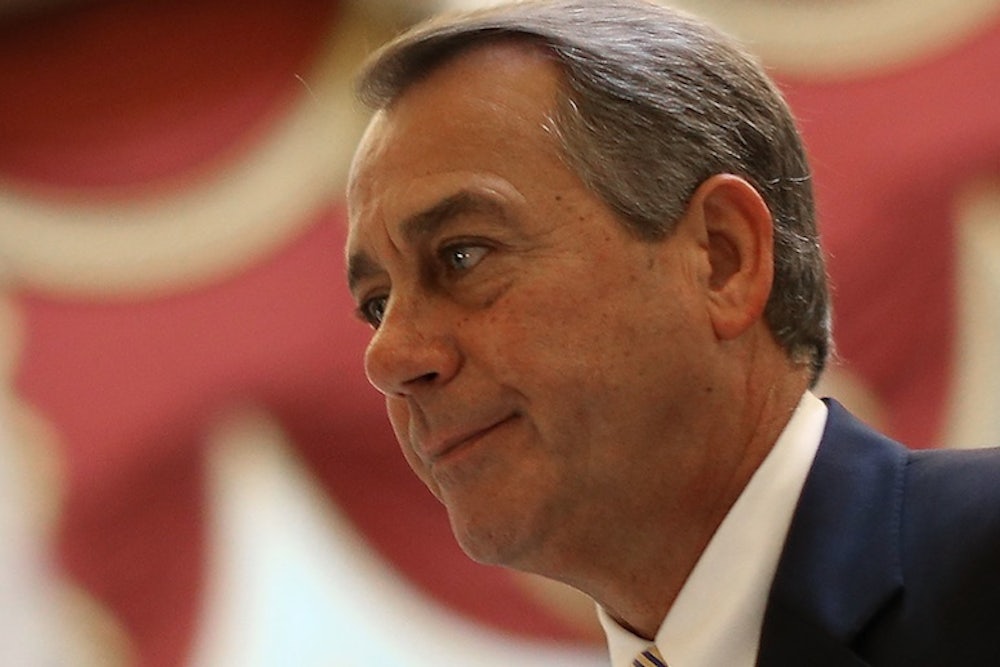We’re in Week Three of the government shutdown, speeding toward the October 17 debt ceiling deadline. The stalemate continues, and the Smithsonian's still closed. We know the two parties are talking, but what are they actually saying? We're not talking tea leaves here; rather, definitions. Here's a handy glossary for the procedural and partisan parlance of the "shutdown showdown" and "debt-ceiling debacle."
Affordable Care Act: President Obama's signature health care law, which triggered House Republicans to shut down the government. The public is more opposed to the ACA when it's referred to by its nickname, Obamacare.
Blink: As in, who’ll blink first, Democrats or Republicans? Obama or Boehner? If the government shutdown could be resolved by a staring contest rather than a House vote, we might actually get somewhere.
Cloture: The Senate votes by at least a three-fifths margin to limit debate on a bill, thus ending a filibuster and proceeding to a vote. Senators used this to pass a clean spending bill, much to the chagrin of Senator Ted Cruz and fans of Dr. Seuss.
Compromise: What Republicans claim President Obama is refusing to do. "We're not going to be disrespected. We have to get something out of this. And I don't know what that even is," says Indiana Republican Representative Marlin Stutzman.
CR: Continuing resolutions are appropriations bills passed by Congress to authorize the government’s spending. Obama and the Democrats want a “clean” CR; conservative Republicans initially wanted to muddy the CR with riders to defund or delay the Affordable Care Act (aka Obamacare), but now have scaled back their demands. The Senate has passed a “clean” CR, but House Speaker John Boehner won’t bring it to the floor, saying he doesn’t have enough votes in the Republican-controlled House. Democrats say Boehner should call a vote and prove it.
Debt Ceiling: A limit to the amount of money the government can borrow. Congress must raise it—if they don’t, the U.S. Treasury can’t pay its bills. If Congress does not lift the debt ceiling by October 17, the U.S. will run out of money by November 1. Missing this deadline risks sending our economy back into a recession, making the shutdown seem almost pleasurable in comparison.
Debt Limit Deniers: A cohort of conservatives who don’t believe the U.S. will default on its loan obligations if the debt ceiling isn't lifted. They’re willing to risk economic catastrophe to teach the government a tough-love lesson in spending.
Discharge Petition: A seldom-used procedural rule that allows a majority in the House to force a floor vote in defiance of the leadership. House Democrats announced last week they would use this to end the shutdown stalemate—but they need at least 18 Republicans to break rank for the plan to work.
Echo Chamber: The cloistered world in which conservative Republicans live, blinding them to the fact that the public is overwhelmingly opposed to their actions.
Freedom: What Tea Partiers claim Obamacare will rob us of.
Furlough: A forced, indefinite, unpaid, and emotionally distressing leave of absence for more than 800,000 federal workers. Employees can’t so much as check their e-mail.
Hastert Rule: Boehner’s excuse for not bringing the shutdown vote to the floor. Named for former Speaker of the House Dennis Hastert—who now denies it’s an actual rule—it purports that a “majority of the majority” must support a bill for a floor vote.
Medical-Device Tax: A 2.3 percent tax on the sale of some medical devices, from surgical gloves to artificial knees, that will help fund the Affordable Care Act. House Republicans included a repeal of this tax, along with a one-year delay in implementing Obamacare, in the funding bill they sent to the Senate. The issue is lining K Street's pockets.
Negotiation: A homonym: It sounds and is spelled the same in both Republican and Democratic dialects, but usage varies. Republicans interpret negotiation as Obama rebuffing their demands; Democrats and President Obama interpret negotation as extortion.
Non-Essential: Federal workers furloughed during the shutdown. An epithet in certain contexts. Includes Nobel Prize winners.
Nuclear Option: Democrats’ option of last resort to raise the debt limit with a majority 51 votes rather than 60—which they threatened to deploy if Republicans filibuster.
Reinsurance Tax: A fee on group insurance plans to offset the higher cost of insuring sick patients under the Affordable Care Act. Labor unions oppose it, and the Senate proposed a delay of the tax in its proposal to end the shutdown.
Shutdown: Congress failed to pass a budget or authorize a resolution to fund the government by the end of this fiscal year (October 1). So we're closed, kind of. Tea Party Republicans are getting the brunt of the blame for the shutdown, but that’s no consolation to the thousands affected by the shutdown.
The Silent Treatment: What Obama is giving to Congress, according to Paul Ryan.
Train Wreck: Senator Max Baucus—one of the prime authors of the Affordable Care Act—used this turn of phrase during a hearing on health care this spring in which he expressed concern about the roll-out of Obamacare. Tea Party Republicans everywhere rejoiced, and will never let it go.
Unconditional Surrender: "The president said today if there's unconditional surrender by Republicans, he'll sit down and talk to us. That's not the way our government works," Boehner said last week, failing to remember that the government isn't working at all right now.
Zoo: A park that displays animals in enclosures. A famous one is closed due to the shutdown, causing the panda cam to go dark and a sad photo to go photo. Synonymous with "Congress."
